HPS 121: Psychology Individual And Social Development
VerifiedAdded on 2022/09/02
|9
|2416
|24
AI Summary
Contribute Materials
Your contribution can guide someone’s learning journey. Share your
documents today.
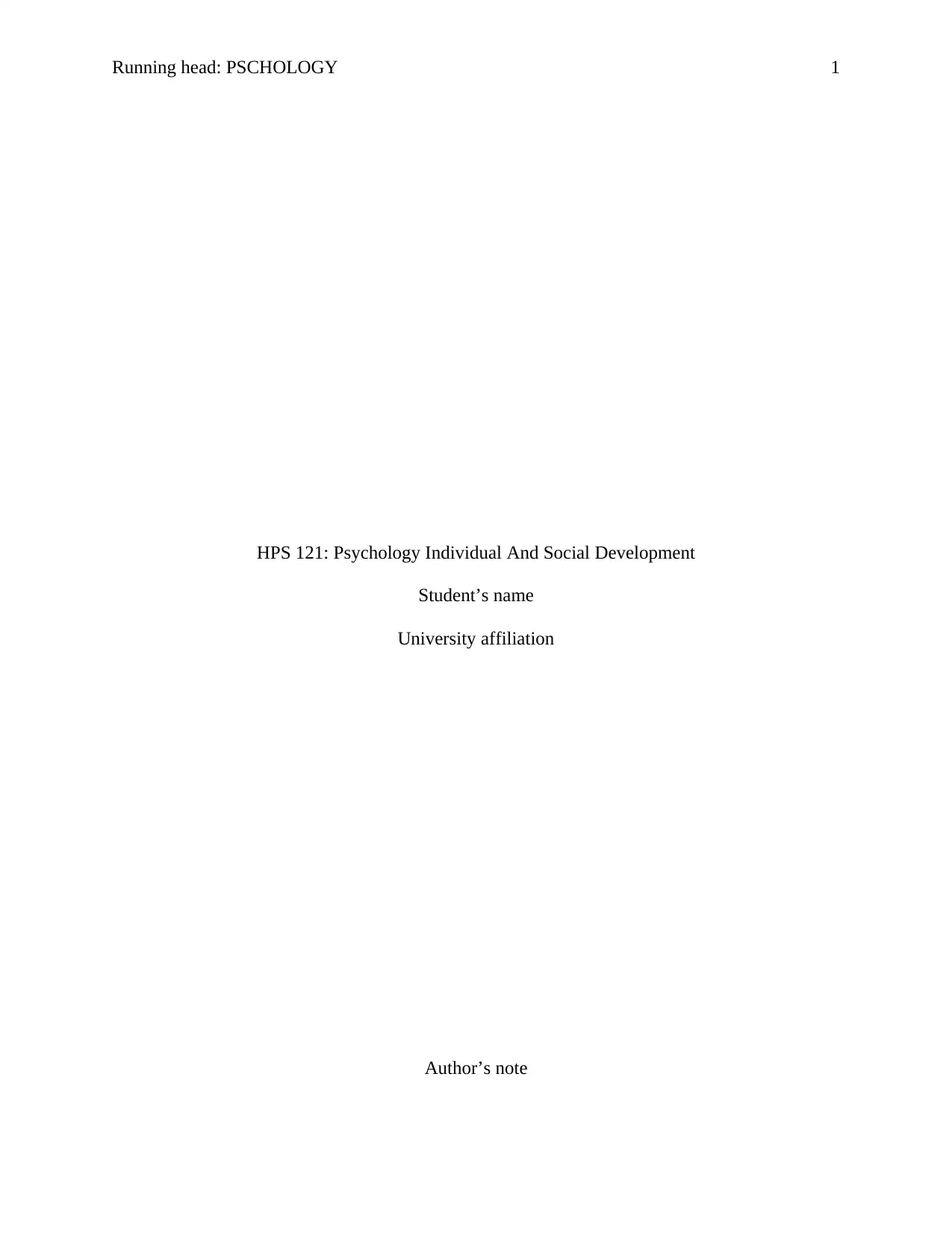
Running head: PSCHOLOGY 1
HPS 121: Psychology Individual And Social Development
Student’s name
University affiliation
Author’s note
HPS 121: Psychology Individual And Social Development
Student’s name
University affiliation
Author’s note
Secure Best Marks with AI Grader
Need help grading? Try our AI Grader for instant feedback on your assignments.
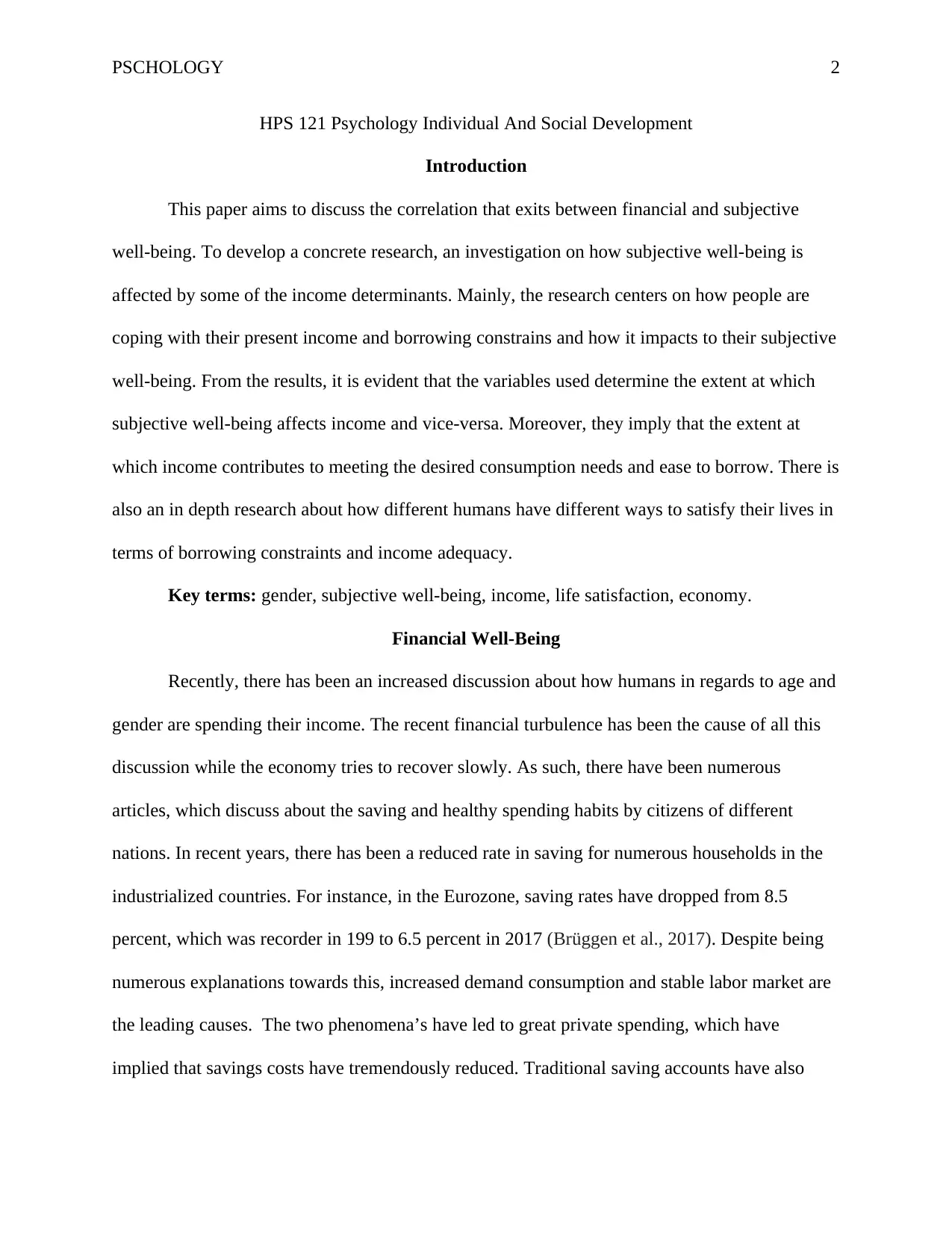
PSCHOLOGY 2
HPS 121 Psychology Individual And Social Development
Introduction
This paper aims to discuss the correlation that exits between financial and subjective
well-being. To develop a concrete research, an investigation on how subjective well-being is
affected by some of the income determinants. Mainly, the research centers on how people are
coping with their present income and borrowing constrains and how it impacts to their subjective
well-being. From the results, it is evident that the variables used determine the extent at which
subjective well-being affects income and vice-versa. Moreover, they imply that the extent at
which income contributes to meeting the desired consumption needs and ease to borrow. There is
also an in depth research about how different humans have different ways to satisfy their lives in
terms of borrowing constraints and income adequacy.
Key terms: gender, subjective well-being, income, life satisfaction, economy.
Financial Well-Being
Recently, there has been an increased discussion about how humans in regards to age and
gender are spending their income. The recent financial turbulence has been the cause of all this
discussion while the economy tries to recover slowly. As such, there have been numerous
articles, which discuss about the saving and healthy spending habits by citizens of different
nations. In recent years, there has been a reduced rate in saving for numerous households in the
industrialized countries. For instance, in the Eurozone, saving rates have dropped from 8.5
percent, which was recorder in 199 to 6.5 percent in 2017 (Brüggen et al., 2017). Despite being
numerous explanations towards this, increased demand consumption and stable labor market are
the leading causes. The two phenomena’s have led to great private spending, which have
implied that savings costs have tremendously reduced. Traditional saving accounts have also
HPS 121 Psychology Individual And Social Development
Introduction
This paper aims to discuss the correlation that exits between financial and subjective
well-being. To develop a concrete research, an investigation on how subjective well-being is
affected by some of the income determinants. Mainly, the research centers on how people are
coping with their present income and borrowing constrains and how it impacts to their subjective
well-being. From the results, it is evident that the variables used determine the extent at which
subjective well-being affects income and vice-versa. Moreover, they imply that the extent at
which income contributes to meeting the desired consumption needs and ease to borrow. There is
also an in depth research about how different humans have different ways to satisfy their lives in
terms of borrowing constraints and income adequacy.
Key terms: gender, subjective well-being, income, life satisfaction, economy.
Financial Well-Being
Recently, there has been an increased discussion about how humans in regards to age and
gender are spending their income. The recent financial turbulence has been the cause of all this
discussion while the economy tries to recover slowly. As such, there have been numerous
articles, which discuss about the saving and healthy spending habits by citizens of different
nations. In recent years, there has been a reduced rate in saving for numerous households in the
industrialized countries. For instance, in the Eurozone, saving rates have dropped from 8.5
percent, which was recorder in 199 to 6.5 percent in 2017 (Brüggen et al., 2017). Despite being
numerous explanations towards this, increased demand consumption and stable labor market are
the leading causes. The two phenomena’s have led to great private spending, which have
implied that savings costs have tremendously reduced. Traditional saving accounts have also
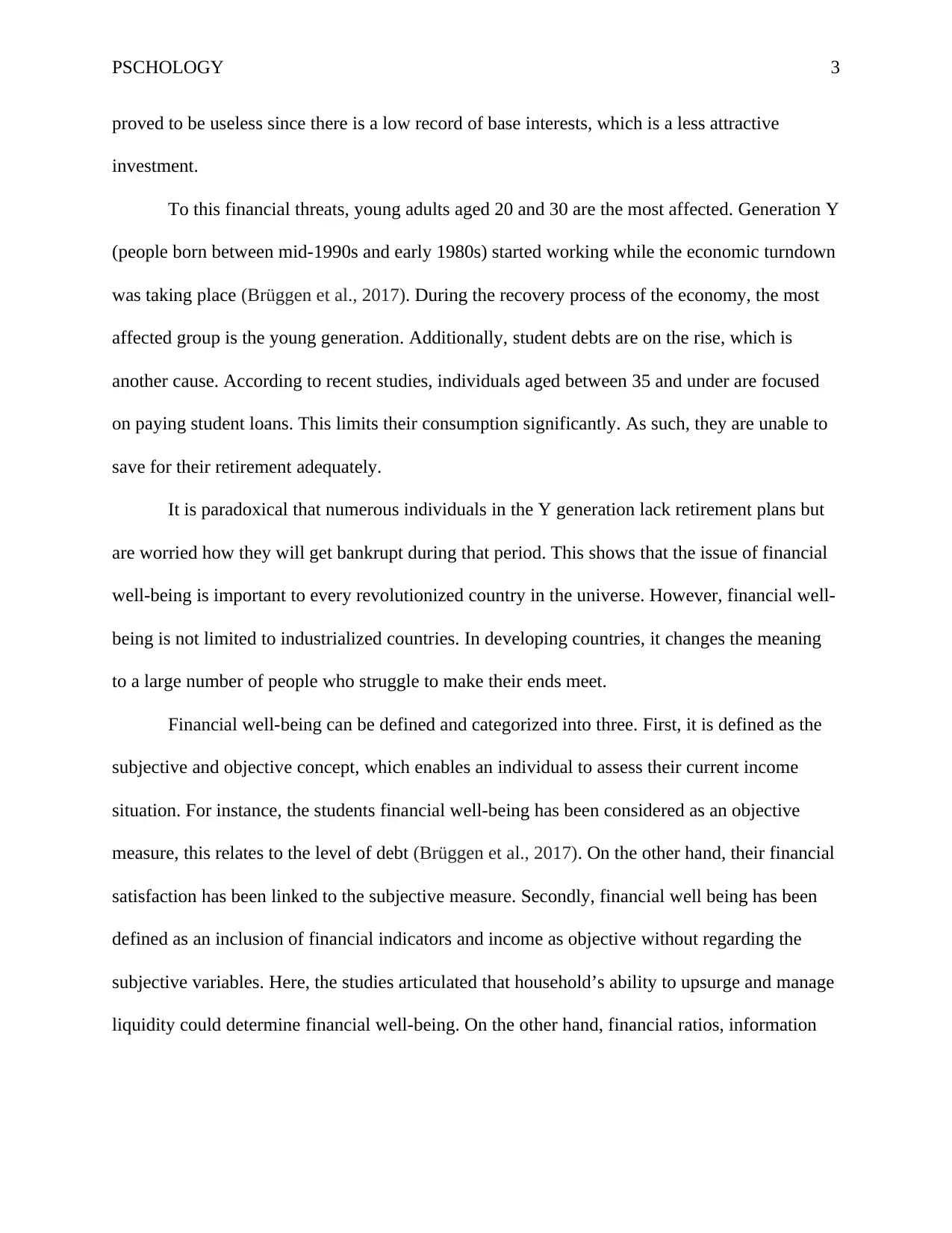
PSCHOLOGY 3
proved to be useless since there is a low record of base interests, which is a less attractive
investment.
To this financial threats, young adults aged 20 and 30 are the most affected. Generation Y
(people born between mid-1990s and early 1980s) started working while the economic turndown
was taking place (Brüggen et al., 2017). During the recovery process of the economy, the most
affected group is the young generation. Additionally, student debts are on the rise, which is
another cause. According to recent studies, individuals aged between 35 and under are focused
on paying student loans. This limits their consumption significantly. As such, they are unable to
save for their retirement adequately.
It is paradoxical that numerous individuals in the Y generation lack retirement plans but
are worried how they will get bankrupt during that period. This shows that the issue of financial
well-being is important to every revolutionized country in the universe. However, financial well-
being is not limited to industrialized countries. In developing countries, it changes the meaning
to a large number of people who struggle to make their ends meet.
Financial well-being can be defined and categorized into three. First, it is defined as the
subjective and objective concept, which enables an individual to assess their current income
situation. For instance, the students financial well-being has been considered as an objective
measure, this relates to the level of debt (Brüggen et al., 2017). On the other hand, their financial
satisfaction has been linked to the subjective measure. Secondly, financial well being has been
defined as an inclusion of financial indicators and income as objective without regarding the
subjective variables. Here, the studies articulated that household’s ability to upsurge and manage
liquidity could determine financial well-being. On the other hand, financial ratios, information
proved to be useless since there is a low record of base interests, which is a less attractive
investment.
To this financial threats, young adults aged 20 and 30 are the most affected. Generation Y
(people born between mid-1990s and early 1980s) started working while the economic turndown
was taking place (Brüggen et al., 2017). During the recovery process of the economy, the most
affected group is the young generation. Additionally, student debts are on the rise, which is
another cause. According to recent studies, individuals aged between 35 and under are focused
on paying student loans. This limits their consumption significantly. As such, they are unable to
save for their retirement adequately.
It is paradoxical that numerous individuals in the Y generation lack retirement plans but
are worried how they will get bankrupt during that period. This shows that the issue of financial
well-being is important to every revolutionized country in the universe. However, financial well-
being is not limited to industrialized countries. In developing countries, it changes the meaning
to a large number of people who struggle to make their ends meet.
Financial well-being can be defined and categorized into three. First, it is defined as the
subjective and objective concept, which enables an individual to assess their current income
situation. For instance, the students financial well-being has been considered as an objective
measure, this relates to the level of debt (Brüggen et al., 2017). On the other hand, their financial
satisfaction has been linked to the subjective measure. Secondly, financial well being has been
defined as an inclusion of financial indicators and income as objective without regarding the
subjective variables. Here, the studies articulated that household’s ability to upsurge and manage
liquidity could determine financial well-being. On the other hand, financial ratios, information
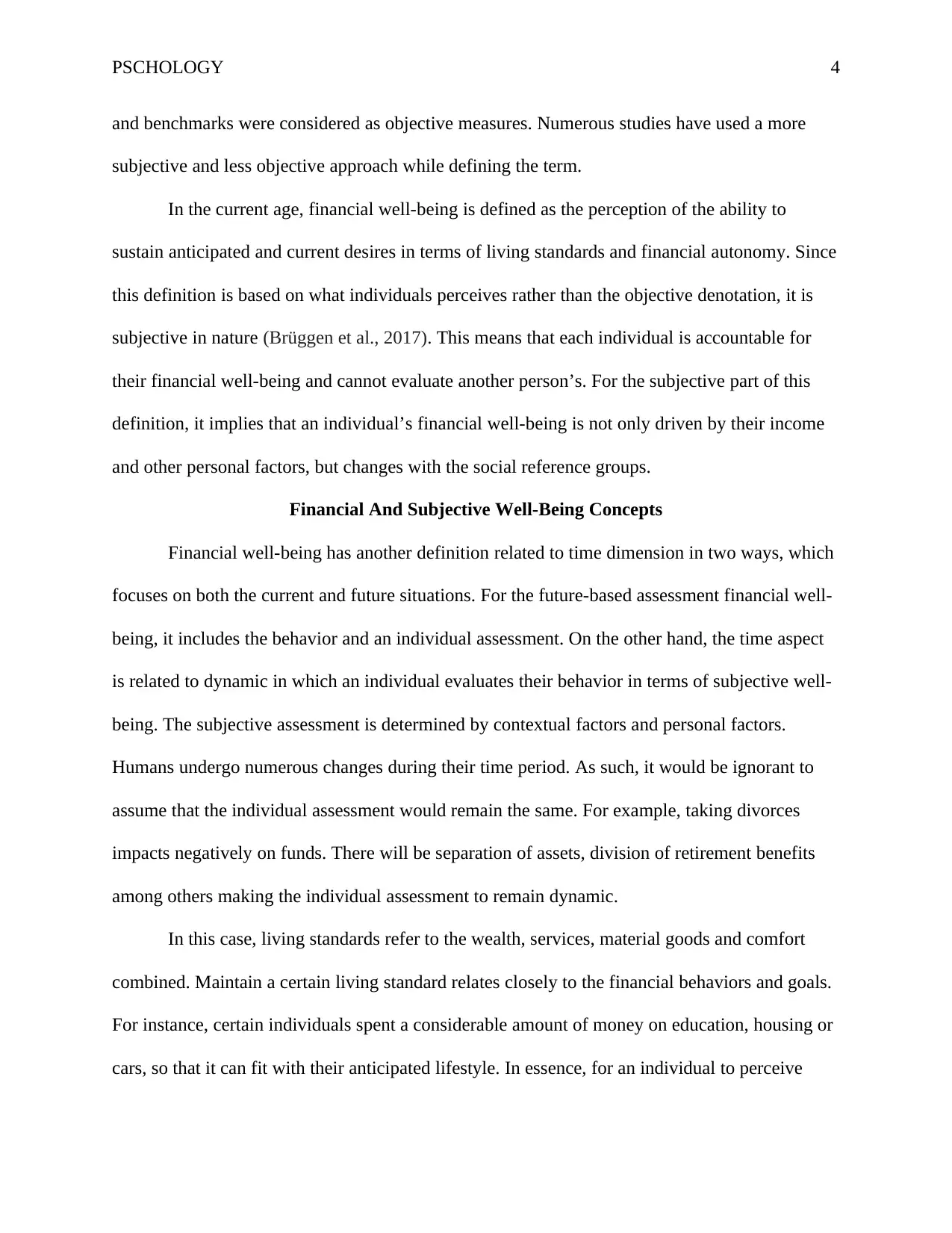
PSCHOLOGY 4
and benchmarks were considered as objective measures. Numerous studies have used a more
subjective and less objective approach while defining the term.
In the current age, financial well-being is defined as the perception of the ability to
sustain anticipated and current desires in terms of living standards and financial autonomy. Since
this definition is based on what individuals perceives rather than the objective denotation, it is
subjective in nature (Brüggen et al., 2017). This means that each individual is accountable for
their financial well-being and cannot evaluate another person’s. For the subjective part of this
definition, it implies that an individual’s financial well-being is not only driven by their income
and other personal factors, but changes with the social reference groups.
Financial And Subjective Well-Being Concepts
Financial well-being has another definition related to time dimension in two ways, which
focuses on both the current and future situations. For the future-based assessment financial well-
being, it includes the behavior and an individual assessment. On the other hand, the time aspect
is related to dynamic in which an individual evaluates their behavior in terms of subjective well-
being. The subjective assessment is determined by contextual factors and personal factors.
Humans undergo numerous changes during their time period. As such, it would be ignorant to
assume that the individual assessment would remain the same. For example, taking divorces
impacts negatively on funds. There will be separation of assets, division of retirement benefits
among others making the individual assessment to remain dynamic.
In this case, living standards refer to the wealth, services, material goods and comfort
combined. Maintain a certain living standard relates closely to the financial behaviors and goals.
For instance, certain individuals spent a considerable amount of money on education, housing or
cars, so that it can fit with their anticipated lifestyle. In essence, for an individual to perceive
and benchmarks were considered as objective measures. Numerous studies have used a more
subjective and less objective approach while defining the term.
In the current age, financial well-being is defined as the perception of the ability to
sustain anticipated and current desires in terms of living standards and financial autonomy. Since
this definition is based on what individuals perceives rather than the objective denotation, it is
subjective in nature (Brüggen et al., 2017). This means that each individual is accountable for
their financial well-being and cannot evaluate another person’s. For the subjective part of this
definition, it implies that an individual’s financial well-being is not only driven by their income
and other personal factors, but changes with the social reference groups.
Financial And Subjective Well-Being Concepts
Financial well-being has another definition related to time dimension in two ways, which
focuses on both the current and future situations. For the future-based assessment financial well-
being, it includes the behavior and an individual assessment. On the other hand, the time aspect
is related to dynamic in which an individual evaluates their behavior in terms of subjective well-
being. The subjective assessment is determined by contextual factors and personal factors.
Humans undergo numerous changes during their time period. As such, it would be ignorant to
assume that the individual assessment would remain the same. For example, taking divorces
impacts negatively on funds. There will be separation of assets, division of retirement benefits
among others making the individual assessment to remain dynamic.
In this case, living standards refer to the wealth, services, material goods and comfort
combined. Maintain a certain living standard relates closely to the financial behaviors and goals.
For instance, certain individuals spent a considerable amount of money on education, housing or
cars, so that it can fit with their anticipated lifestyle. In essence, for an individual to perceive
Secure Best Marks with AI Grader
Need help grading? Try our AI Grader for instant feedback on your assignments.
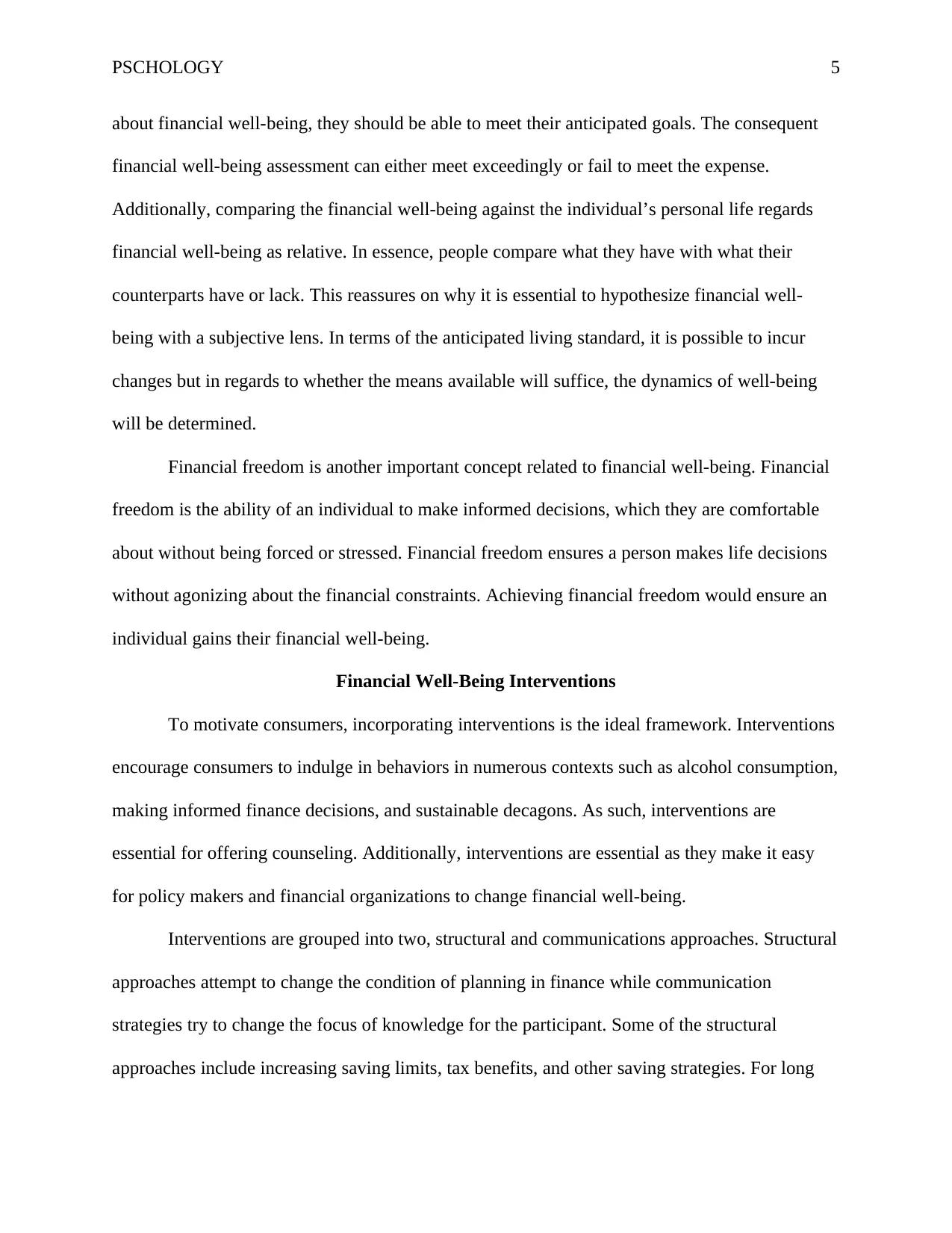
PSCHOLOGY 5
about financial well-being, they should be able to meet their anticipated goals. The consequent
financial well-being assessment can either meet exceedingly or fail to meet the expense.
Additionally, comparing the financial well-being against the individual’s personal life regards
financial well-being as relative. In essence, people compare what they have with what their
counterparts have or lack. This reassures on why it is essential to hypothesize financial well-
being with a subjective lens. In terms of the anticipated living standard, it is possible to incur
changes but in regards to whether the means available will suffice, the dynamics of well-being
will be determined.
Financial freedom is another important concept related to financial well-being. Financial
freedom is the ability of an individual to make informed decisions, which they are comfortable
about without being forced or stressed. Financial freedom ensures a person makes life decisions
without agonizing about the financial constraints. Achieving financial freedom would ensure an
individual gains their financial well-being.
Financial Well-Being Interventions
To motivate consumers, incorporating interventions is the ideal framework. Interventions
encourage consumers to indulge in behaviors in numerous contexts such as alcohol consumption,
making informed finance decisions, and sustainable decagons. As such, interventions are
essential for offering counseling. Additionally, interventions are essential as they make it easy
for policy makers and financial organizations to change financial well-being.
Interventions are grouped into two, structural and communications approaches. Structural
approaches attempt to change the condition of planning in finance while communication
strategies try to change the focus of knowledge for the participant. Some of the structural
approaches include increasing saving limits, tax benefits, and other saving strategies. For long
about financial well-being, they should be able to meet their anticipated goals. The consequent
financial well-being assessment can either meet exceedingly or fail to meet the expense.
Additionally, comparing the financial well-being against the individual’s personal life regards
financial well-being as relative. In essence, people compare what they have with what their
counterparts have or lack. This reassures on why it is essential to hypothesize financial well-
being with a subjective lens. In terms of the anticipated living standard, it is possible to incur
changes but in regards to whether the means available will suffice, the dynamics of well-being
will be determined.
Financial freedom is another important concept related to financial well-being. Financial
freedom is the ability of an individual to make informed decisions, which they are comfortable
about without being forced or stressed. Financial freedom ensures a person makes life decisions
without agonizing about the financial constraints. Achieving financial freedom would ensure an
individual gains their financial well-being.
Financial Well-Being Interventions
To motivate consumers, incorporating interventions is the ideal framework. Interventions
encourage consumers to indulge in behaviors in numerous contexts such as alcohol consumption,
making informed finance decisions, and sustainable decagons. As such, interventions are
essential for offering counseling. Additionally, interventions are essential as they make it easy
for policy makers and financial organizations to change financial well-being.
Interventions are grouped into two, structural and communications approaches. Structural
approaches attempt to change the condition of planning in finance while communication
strategies try to change the focus of knowledge for the participant. Some of the structural
approaches include increasing saving limits, tax benefits, and other saving strategies. For long
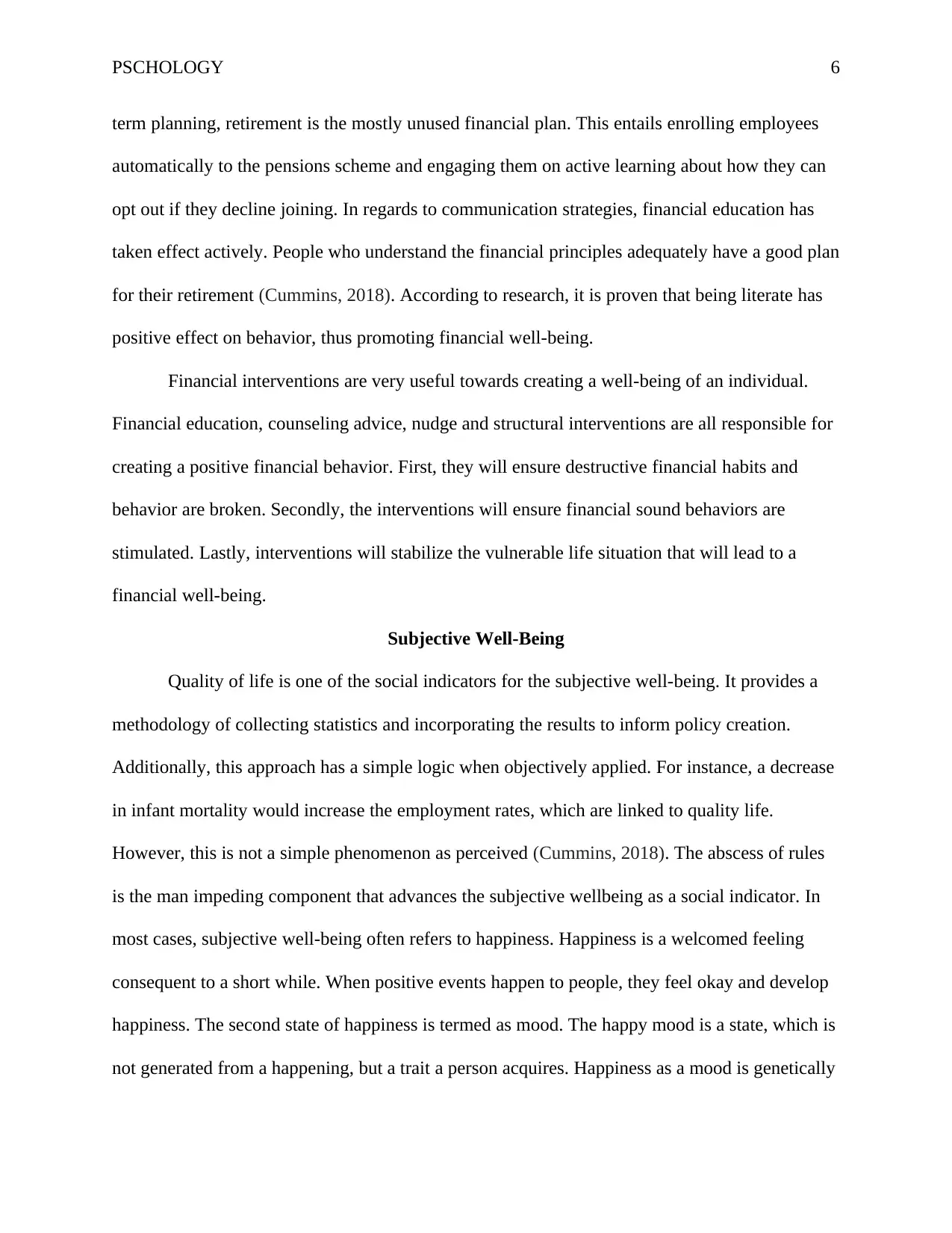
PSCHOLOGY 6
term planning, retirement is the mostly unused financial plan. This entails enrolling employees
automatically to the pensions scheme and engaging them on active learning about how they can
opt out if they decline joining. In regards to communication strategies, financial education has
taken effect actively. People who understand the financial principles adequately have a good plan
for their retirement (Cummins, 2018). According to research, it is proven that being literate has
positive effect on behavior, thus promoting financial well-being.
Financial interventions are very useful towards creating a well-being of an individual.
Financial education, counseling advice, nudge and structural interventions are all responsible for
creating a positive financial behavior. First, they will ensure destructive financial habits and
behavior are broken. Secondly, the interventions will ensure financial sound behaviors are
stimulated. Lastly, interventions will stabilize the vulnerable life situation that will lead to a
financial well-being.
Subjective Well-Being
Quality of life is one of the social indicators for the subjective well-being. It provides a
methodology of collecting statistics and incorporating the results to inform policy creation.
Additionally, this approach has a simple logic when objectively applied. For instance, a decrease
in infant mortality would increase the employment rates, which are linked to quality life.
However, this is not a simple phenomenon as perceived (Cummins, 2018). The abscess of rules
is the man impeding component that advances the subjective wellbeing as a social indicator. In
most cases, subjective well-being often refers to happiness. Happiness is a welcomed feeling
consequent to a short while. When positive events happen to people, they feel okay and develop
happiness. The second state of happiness is termed as mood. The happy mood is a state, which is
not generated from a happening, but a trait a person acquires. Happiness as a mood is genetically
term planning, retirement is the mostly unused financial plan. This entails enrolling employees
automatically to the pensions scheme and engaging them on active learning about how they can
opt out if they decline joining. In regards to communication strategies, financial education has
taken effect actively. People who understand the financial principles adequately have a good plan
for their retirement (Cummins, 2018). According to research, it is proven that being literate has
positive effect on behavior, thus promoting financial well-being.
Financial interventions are very useful towards creating a well-being of an individual.
Financial education, counseling advice, nudge and structural interventions are all responsible for
creating a positive financial behavior. First, they will ensure destructive financial habits and
behavior are broken. Secondly, the interventions will ensure financial sound behaviors are
stimulated. Lastly, interventions will stabilize the vulnerable life situation that will lead to a
financial well-being.
Subjective Well-Being
Quality of life is one of the social indicators for the subjective well-being. It provides a
methodology of collecting statistics and incorporating the results to inform policy creation.
Additionally, this approach has a simple logic when objectively applied. For instance, a decrease
in infant mortality would increase the employment rates, which are linked to quality life.
However, this is not a simple phenomenon as perceived (Cummins, 2018). The abscess of rules
is the man impeding component that advances the subjective wellbeing as a social indicator. In
most cases, subjective well-being often refers to happiness. Happiness is a welcomed feeling
consequent to a short while. When positive events happen to people, they feel okay and develop
happiness. The second state of happiness is termed as mood. The happy mood is a state, which is
not generated from a happening, but a trait a person acquires. Happiness as a mood is genetically
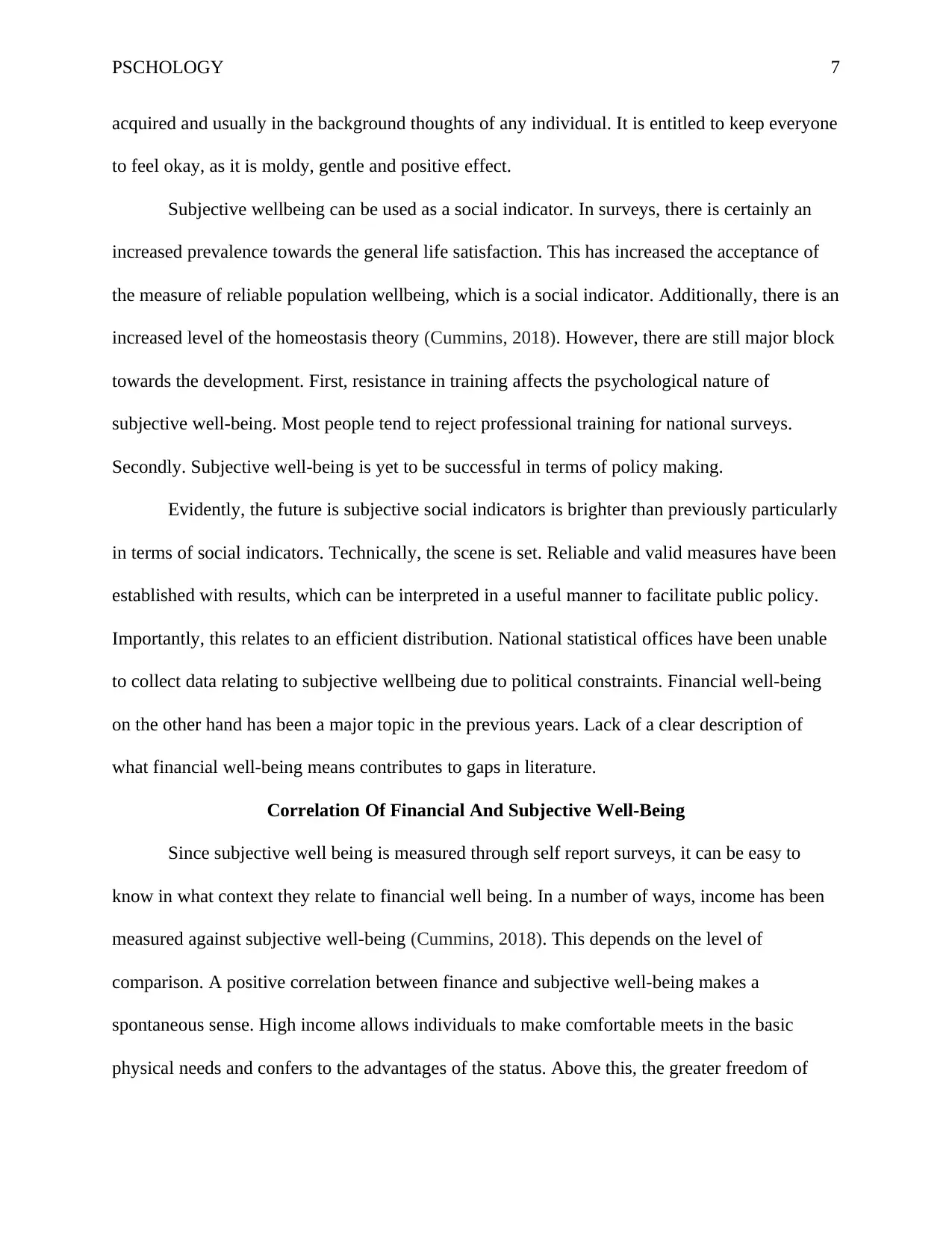
PSCHOLOGY 7
acquired and usually in the background thoughts of any individual. It is entitled to keep everyone
to feel okay, as it is moldy, gentle and positive effect.
Subjective wellbeing can be used as a social indicator. In surveys, there is certainly an
increased prevalence towards the general life satisfaction. This has increased the acceptance of
the measure of reliable population wellbeing, which is a social indicator. Additionally, there is an
increased level of the homeostasis theory (Cummins, 2018). However, there are still major block
towards the development. First, resistance in training affects the psychological nature of
subjective well-being. Most people tend to reject professional training for national surveys.
Secondly. Subjective well-being is yet to be successful in terms of policy making.
Evidently, the future is subjective social indicators is brighter than previously particularly
in terms of social indicators. Technically, the scene is set. Reliable and valid measures have been
established with results, which can be interpreted in a useful manner to facilitate public policy.
Importantly, this relates to an efficient distribution. National statistical offices have been unable
to collect data relating to subjective wellbeing due to political constraints. Financial well-being
on the other hand has been a major topic in the previous years. Lack of a clear description of
what financial well-being means contributes to gaps in literature.
Correlation Of Financial And Subjective Well-Being
Since subjective well being is measured through self report surveys, it can be easy to
know in what context they relate to financial well being. In a number of ways, income has been
measured against subjective well-being (Cummins, 2018). This depends on the level of
comparison. A positive correlation between finance and subjective well-being makes a
spontaneous sense. High income allows individuals to make comfortable meets in the basic
physical needs and confers to the advantages of the status. Above this, the greater freedom of
acquired and usually in the background thoughts of any individual. It is entitled to keep everyone
to feel okay, as it is moldy, gentle and positive effect.
Subjective wellbeing can be used as a social indicator. In surveys, there is certainly an
increased prevalence towards the general life satisfaction. This has increased the acceptance of
the measure of reliable population wellbeing, which is a social indicator. Additionally, there is an
increased level of the homeostasis theory (Cummins, 2018). However, there are still major block
towards the development. First, resistance in training affects the psychological nature of
subjective well-being. Most people tend to reject professional training for national surveys.
Secondly. Subjective well-being is yet to be successful in terms of policy making.
Evidently, the future is subjective social indicators is brighter than previously particularly
in terms of social indicators. Technically, the scene is set. Reliable and valid measures have been
established with results, which can be interpreted in a useful manner to facilitate public policy.
Importantly, this relates to an efficient distribution. National statistical offices have been unable
to collect data relating to subjective wellbeing due to political constraints. Financial well-being
on the other hand has been a major topic in the previous years. Lack of a clear description of
what financial well-being means contributes to gaps in literature.
Correlation Of Financial And Subjective Well-Being
Since subjective well being is measured through self report surveys, it can be easy to
know in what context they relate to financial well being. In a number of ways, income has been
measured against subjective well-being (Cummins, 2018). This depends on the level of
comparison. A positive correlation between finance and subjective well-being makes a
spontaneous sense. High income allows individuals to make comfortable meets in the basic
physical needs and confers to the advantages of the status. Above this, the greater freedom of
Paraphrase This Document
Need a fresh take? Get an instant paraphrase of this document with our AI Paraphraser
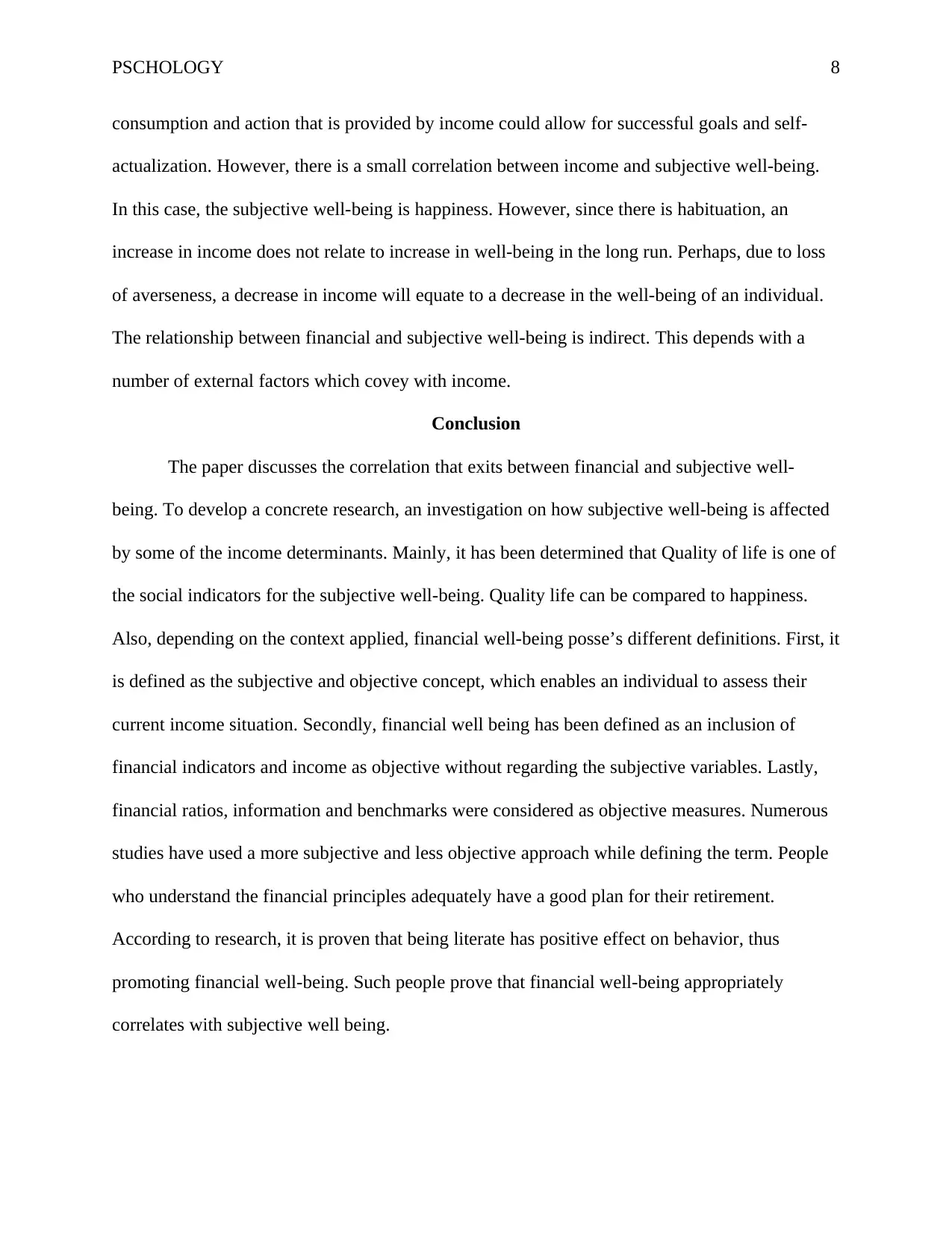
PSCHOLOGY 8
consumption and action that is provided by income could allow for successful goals and self-
actualization. However, there is a small correlation between income and subjective well-being.
In this case, the subjective well-being is happiness. However, since there is habituation, an
increase in income does not relate to increase in well-being in the long run. Perhaps, due to loss
of averseness, a decrease in income will equate to a decrease in the well-being of an individual.
The relationship between financial and subjective well-being is indirect. This depends with a
number of external factors which covey with income.
Conclusion
The paper discusses the correlation that exits between financial and subjective well-
being. To develop a concrete research, an investigation on how subjective well-being is affected
by some of the income determinants. Mainly, it has been determined that Quality of life is one of
the social indicators for the subjective well-being. Quality life can be compared to happiness.
Also, depending on the context applied, financial well-being posse’s different definitions. First, it
is defined as the subjective and objective concept, which enables an individual to assess their
current income situation. Secondly, financial well being has been defined as an inclusion of
financial indicators and income as objective without regarding the subjective variables. Lastly,
financial ratios, information and benchmarks were considered as objective measures. Numerous
studies have used a more subjective and less objective approach while defining the term. People
who understand the financial principles adequately have a good plan for their retirement.
According to research, it is proven that being literate has positive effect on behavior, thus
promoting financial well-being. Such people prove that financial well-being appropriately
correlates with subjective well being.
consumption and action that is provided by income could allow for successful goals and self-
actualization. However, there is a small correlation between income and subjective well-being.
In this case, the subjective well-being is happiness. However, since there is habituation, an
increase in income does not relate to increase in well-being in the long run. Perhaps, due to loss
of averseness, a decrease in income will equate to a decrease in the well-being of an individual.
The relationship between financial and subjective well-being is indirect. This depends with a
number of external factors which covey with income.
Conclusion
The paper discusses the correlation that exits between financial and subjective well-
being. To develop a concrete research, an investigation on how subjective well-being is affected
by some of the income determinants. Mainly, it has been determined that Quality of life is one of
the social indicators for the subjective well-being. Quality life can be compared to happiness.
Also, depending on the context applied, financial well-being posse’s different definitions. First, it
is defined as the subjective and objective concept, which enables an individual to assess their
current income situation. Secondly, financial well being has been defined as an inclusion of
financial indicators and income as objective without regarding the subjective variables. Lastly,
financial ratios, information and benchmarks were considered as objective measures. Numerous
studies have used a more subjective and less objective approach while defining the term. People
who understand the financial principles adequately have a good plan for their retirement.
According to research, it is proven that being literate has positive effect on behavior, thus
promoting financial well-being. Such people prove that financial well-being appropriately
correlates with subjective well being.
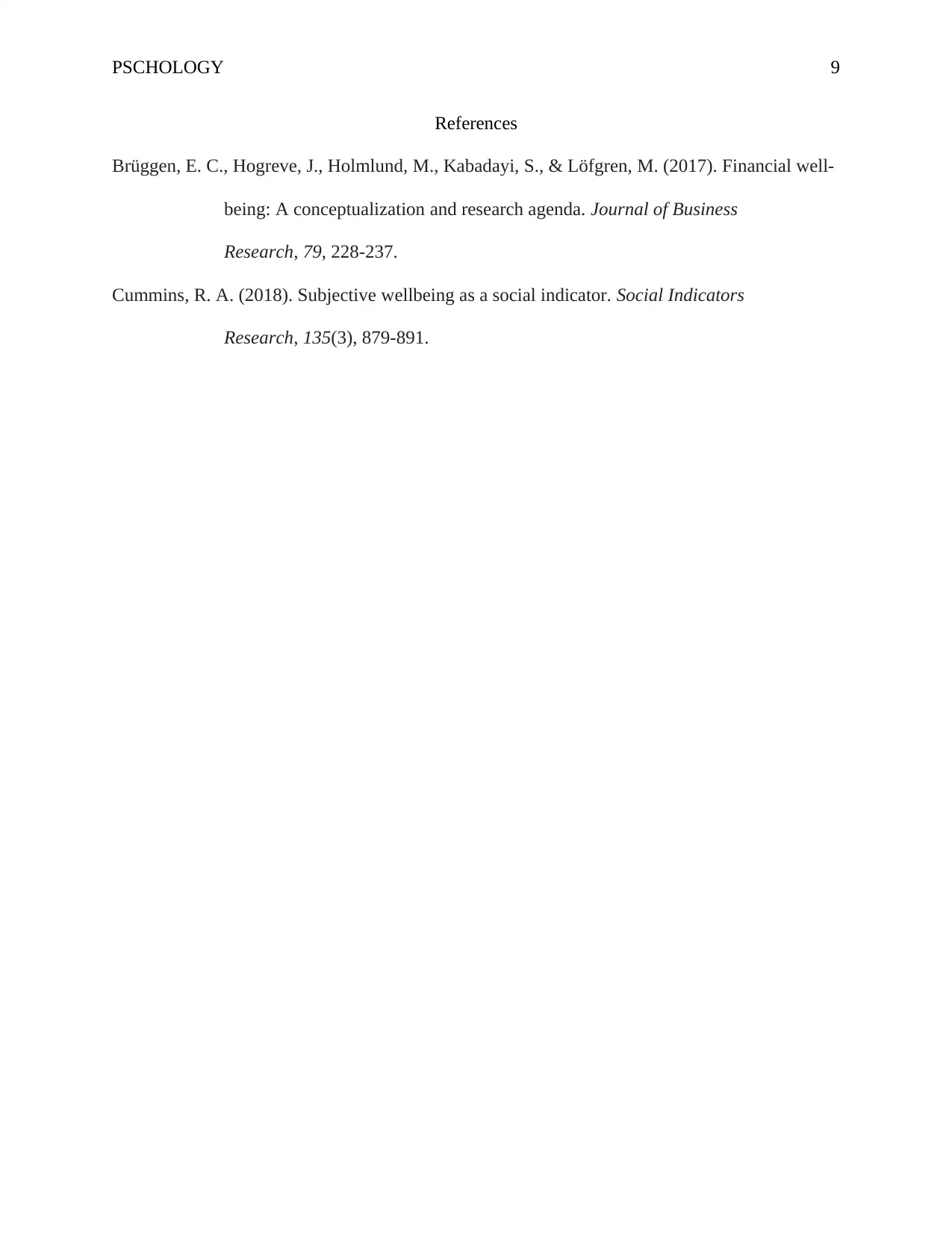
PSCHOLOGY 9
References
Brüggen, E. C., Hogreve, J., Holmlund, M., Kabadayi, S., & Löfgren, M. (2017). Financial well-
being: A conceptualization and research agenda. Journal of Business
Research, 79, 228-237.
Cummins, R. A. (2018). Subjective wellbeing as a social indicator. Social Indicators
Research, 135(3), 879-891.
References
Brüggen, E. C., Hogreve, J., Holmlund, M., Kabadayi, S., & Löfgren, M. (2017). Financial well-
being: A conceptualization and research agenda. Journal of Business
Research, 79, 228-237.
Cummins, R. A. (2018). Subjective wellbeing as a social indicator. Social Indicators
Research, 135(3), 879-891.
1 out of 9
Related Documents
Your All-in-One AI-Powered Toolkit for Academic Success.
+13062052269
info@desklib.com
Available 24*7 on WhatsApp / Email
![[object Object]](/_next/static/media/star-bottom.7253800d.svg)
Unlock your academic potential
© 2024 | Zucol Services PVT LTD | All rights reserved.





